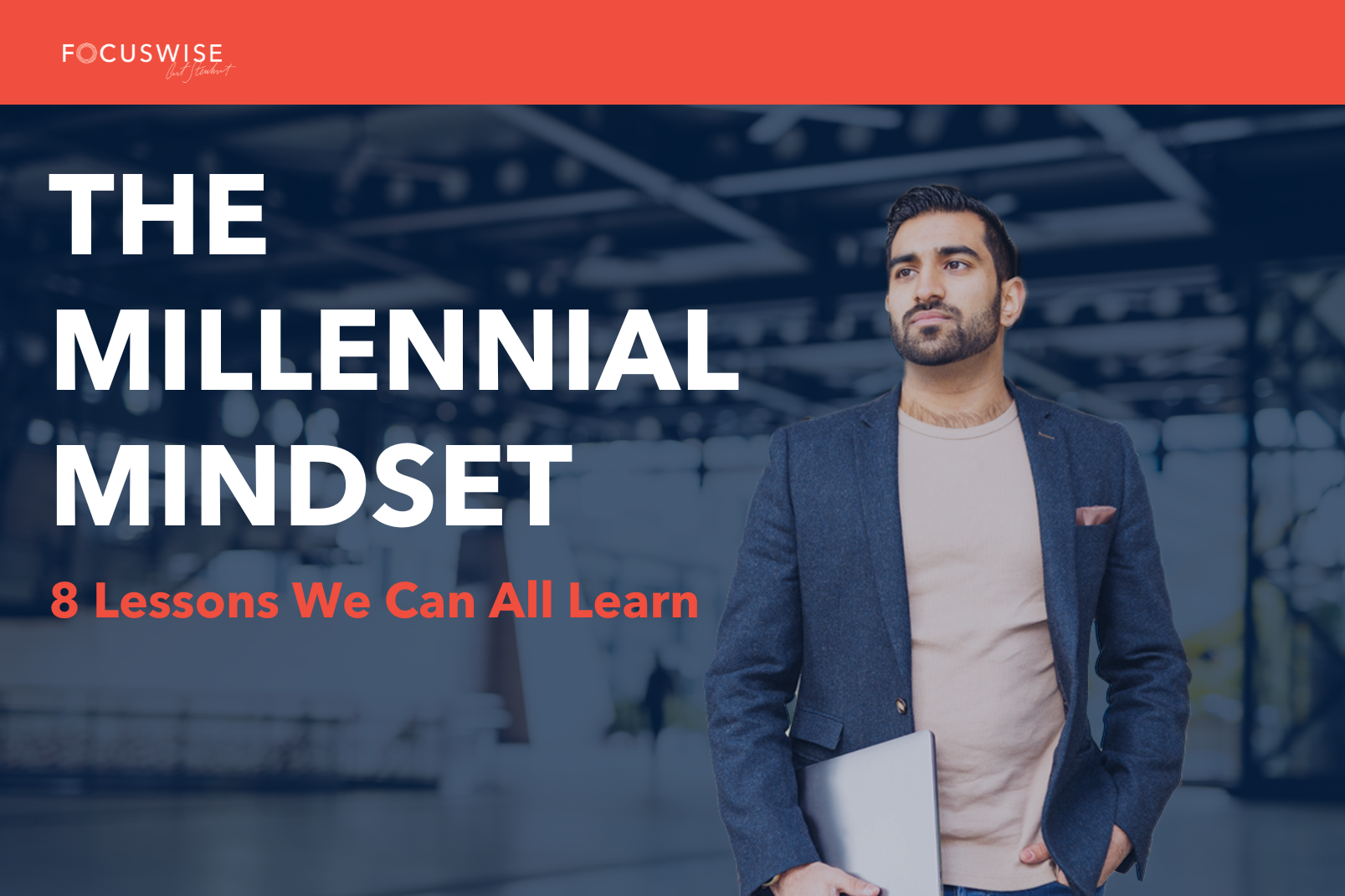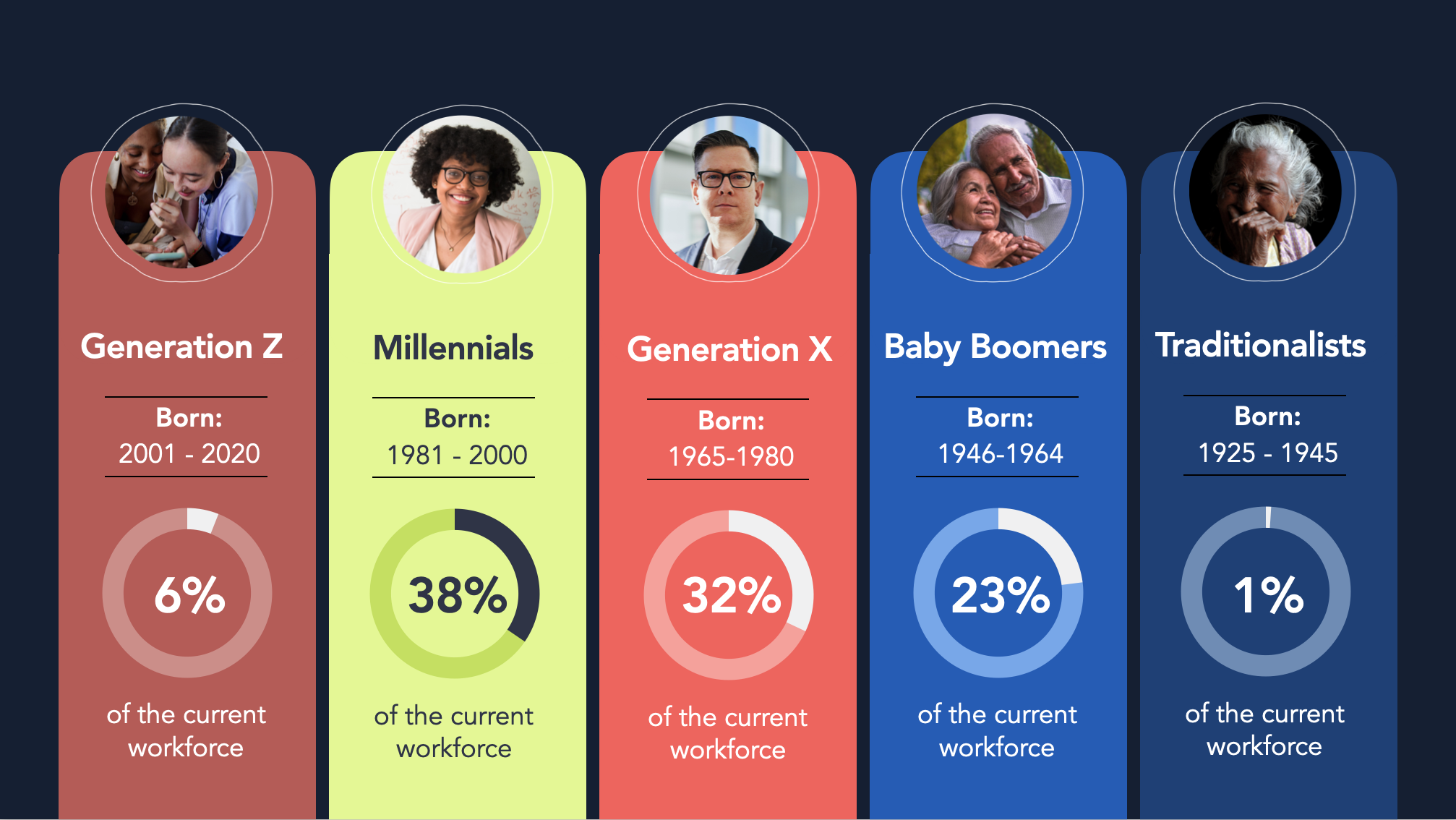The Millennial Mindset: 8 Lessons We Can All Learn
The modern workplace is a dynamic and ever-evolving landscape, shaped by the unique perspectives and contributions of various generations. Among these generations, millennials have captured attention for many reasons — good and bad. Negative stereotypes paint millennials as an entitled generation that does not want to work. But deeper exploration reveals that there’s more to millennials than these superficial generalizations.
The narrative surrounding millennials is far from fading. In fact, millennials form a substantial portion of our workforce, surpassing the presence of any other generation. As we navigate a landscape marked by retiring employees, millennials are uniquely positioned to step into leadership roles, further shaping the trajectory of workplaces worldwide. Perhaps instead of labeling their work ethic as sub-par and assuming their trajectory will steer us all off course, we should dig a little deeper and consider that Millennials might actually be on to something. They could even possess some insights we should all be considering.
In this article, we will delve into the understanding and perceptions (dare we say “wisdom”?) that all workers can derive from millennial employees by expanding on these 8 lessons:
8 lessons we can all learn from millennials:
1. Embrace Technoogy and adopt new trends quickly
Millennials have come of age alongside the rapid proliferation of technology, making them intrinsically comfortable with various digital tools and platforms. Their innate ability to navigate this digital landscape not only streamlines work processes but also serves as an example for other generations to embrace technological transformations. The lesson here is clear: adopting a proactive stance towards technology and cultivating digital fluency can significantly enhance efficiency, communication, and problem-solving across the workforce.
2. Navigate change withflexibility and grace
Stephen Hawking famously said that “intelligence is the ability to adapt to change.” No generation has had to adapt the way the millennial generation has.They entered the workforce during a time of profound economic instability and rapid change, cultivated in them a unique ability to adapt quickly to new situations — an invaluable trait in an era marked by constant disruption. By observing their adaptability, workers of all ages can gain insight into embracing change gracefully and remaining open to novel ways of conducting business. The world of work is evolving at an unprecedented pace, and the ability to pivot and thrive in such an environment is a lesson that millennials exemplify.
3. Redefine the work-life balance equation
The traditional demarcation between work and personal life is being challenged by Millennials. Their emphasis on achieving a harmonious work-life integration, with flexible work arrangements and remote options, emphasizes the importance of productivity and outcomes over mere clocked hours. This approach leads to increased job satisfaction and reduced burnout. Older generations can learn to embrace this mindset, recognizing that balance is not merely about separating work and personal life but finding a synergy that fosters well-being and productivity.
4. Be a lifelong learner
One of the remarkable qualities of Millennials is their relentless pursuit of knowledge and skill development. They understand that in order to remain competitive in today's rapidly changing job market, adapting and upskilling is essential. This commitment to continuous learning is a lesson that all workers can integrate into their careers. Regardless of age, the journey of skill enhancement and knowledge acquisition ensures relevance and adaptability throughout one's professional journey.
5. Foster creativity through differencess
Millennials are known for their fervent belief in diversity and inclusion in the workplace. They value and celebrate differences in perspectives, backgrounds, and experiences, recognizing the profound impact diversity has on creativity and innovation. Learning from this, all workers can cultivate environments that foster open-mindedness, collaboration, and ingenuity. Embracing diversity not only enriches workplace culture but also strengthens problem-solving and decision-making processes.
6. Have an entrepreneurial mindset
An entrepreneurial mindset is a hallmark of many Millennials. They possess an innate drive to seek innovative solutions and take ownership of their work, which encourages proactive problem-solving and creative thinking. This mindset can be invaluable for workers of all ages as they tackle challenges in their careers. Encouraging an entrepreneurial spirit within a traditional work framework can lead to increased autonomy, ownership, and a culture of innovation.
7. Find meaning in your work beyond a paycheck
Millennials are driven by a sense of purpose in their careers. They actively seek work that aligns with their values and contributes to a greater societal impact. This perspective shifts the focus from mere job tasks to a more meaningful contribution. Embracing this lesson can empower workers from all generations to find purpose and fulfillment in their roles, leading to heightened job satisfaction and a deeper sense of personal achievement.
8. Master clear communication
The rise of digital communication platforms has honed millennials' skills in concise and effective communication, both in written and visual forms. Learning from their expertise can help all workers refine their communication skills, resulting in clearer and more efficient interactions with colleagues, clients, and superiors. Effective communication is the backbone of collaboration, and the millennial approach can serve as a model for fostering seamless connectivity in the modern workplace.
Conclusion
As the workforce continues to evolve, the lessons derived from millennial employees' attitudes and behaviors are increasingly pertinent. Their technological fluency, adaptability, commitment to continuous learning, emphasis on diversity, entrepreneurial mindset, pursuit of purpose-driven work, and prowess in digital communication offer a diverse range of insights for workers of all generations.
Embracing these lessons does not entail mimicking the millennial approach, but rather integrating these qualities into one's unique professional journey. The hallmark of a resilient, agile, and successful workforce lies in its ability to learn from one another, transcending generational boundaries. As Millennials continue to influence the modern workplace, professionals of all ages have the opportunity to cultivate a culture that celebrates innovation, inclusivity, and adaptability. By embracing the Millennial mindset, workers can collectively forge a path towards a more collaborative, dynamic, and fulfilling work environment.







